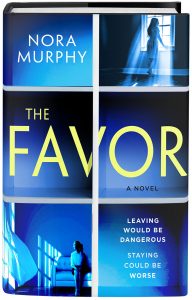The Survivors Who Inspired my Debut Novel
The Survivors Who Inspired my Debut Novel
By: Nora Murphy
 While attending law school, I participated in two clinics through which I studied the issues facing survivors of intimate partner violence—also referred to domestic abuse or domestic violence. After graduating, I worked as a judicial law clerk for two years, before entering private practice—experiences which only furthered what I’d come to learn in law school: intimate partner violence is not just common, but endemic, to the point that many women we know and encounter on a daily basis have suffered or are suffering from such abuse.
While attending law school, I participated in two clinics through which I studied the issues facing survivors of intimate partner violence—also referred to domestic abuse or domestic violence. After graduating, I worked as a judicial law clerk for two years, before entering private practice—experiences which only furthered what I’d come to learn in law school: intimate partner violence is not just common, but endemic, to the point that many women we know and encounter on a daily basis have suffered or are suffering from such abuse.
In fact, recent statistics from the Centers for Disease Control and Protection (CDC) show that one in four women have experienced sexual violence, physical violence, and/or stalking by a current or former partner or spouse. (1) Survivors of color may be even more likely to experience such violence and can face unique barriers and concerns. The physical toll from such violence can be enormous and irrevocable—data from the CDC suggests that approximately one in five homicide victims are killed by an intimate partner.(2) The mental effects of this type of violence are immense and long-lasting.
While factors like low income, low self-esteem, and low academic achievement are linked to a greater likelihood of intimate partner violence, abuse also occurs in many relationships marked by high levels of education and affluence. When it came time for me to write a paper for the Domestic Violence Clinic led by Professor Joan Meier, I considered these sorts of abusers—professional individuals who possess specific skills and expertise, which could afford them special access or credibility. Such professionals may be able to professionalize abuse, or to carry out abuse that is unique and dangerous through the use of skills and access provided to them through their careers and training. For these types of relationships, financial and psychological abuse may be more common than physical abuse, sexual abuse, or stalking, making it more hidden and more difficult to prove.
By way of example, consider the story of Dr. Martin MacNeill, who was convicted of first-degree murder of his wife, Michele, in November 2013. (3) Michele’s family members testified at the trial that Dr. MacNeill insisted that his wife get plastic surgery, and prosecutors argued that MacNeill used Michele’s recovery from the surgery as an excuse to mix painkillers, Valium, and sleeping pills. (4) Prosecutors believed that MacNeill drugged his wife and then drowned her in the bath tub, and jurors agreed. (5)
During his closing arguments, the prosecutor argued that MacNeill “relied on his knowledge and experience as a doctor and also as a lawyer” to carry out his plan to murder Michele. (6) MacNeill was a doctor and he had a license to practice law, but he ultimately surrendered both his law and medical licenses.(7) At MacNeill’s trial, a former paramour testified that MacNeill once told her he could induce a heart attack in someone and make it appear natural. Martin MacNeill took advantage of his knowledge and credibility as a doctor in planning and carrying out his wife’s murder.
Consider also lawyers or judges, who may be able to use their skills to harass and financially damage their current or former intimate partners. Lawyers may be able to adeptly navigate the legal system and even use expertise to obtain civil protective orders as a preemptive strike against a current or former intimate partner.
Corporate professionals may have the ability to manipulate finances and perpetrate financial abuse, which can be used to trap an intimate partner in an abusive relationship. Financial abuse might include forbidding the survivor from seeking work, sabotaging her employment opportunities, withholding money or providing her with only an “allowance,” preventing the survivor from having access to her bank accounts, stealing the survivor’s identity, or refusing to pay bills to ruin the survivor’s credit score.
Survivors of intimate partner violence at the hands of a law enforcement officers may be particularly vulnerable because their abusers might have access to a weapon, know the location of domestic violence shelters, and know how to manipulate the system to avoid punishment or possibly shift blame to the survivor.
The Favor, my debut novel, and its protagonists, Leah and McKenna, were inspired by these types of survivors—those who find themselves stuck in relationships with affluent, educated, and highly credible perpetrators of intimate partner violence. In the novel, Leah and McKenna live parallel lives in the same wealthy, suburban neighborhood, although they have never met. When their paths do cross, while they do not actually discuss their lives or their marriages, Leah sees something familiar in McKenna, understanding what she knows too well from her own marriage: McKenna’s perfect husband is not what he seems. Leah decides to keep an eye out for McKenna, from a distance, until one night, she intervenes, setting into motion a series of events that will change both their lives forever.
I wanted to write a novel that might help outsiders finding themselves looking into such abusive relationships understand that “she can leave any time” can be a naive and dangerous supposition. Particularly when the survivors themselves seem to be highly educated or affluent, many people looking at their situation, and at those of women like them, might think: Why don’t they just leave? But even when it is viable, even when a woman has the support and resources to leave, abusers tend to take extreme measures to prevent their victim from leaving. They cling to control at all costs. Often, it is a threat of separation that precipitates a murder.
Even if a survivor shares her truths with others, she may fear not being believed. This fear may be intensified if her abuser is a professional individual, a pillar of the community, highly educated, and highly credible. If she is married to her abuser, and must seek a divorce, she is likely to be revictimized through the judicial process. She’ll have to file a complaint for divorce, have her abuser served, and, if he does not cooperate, if the case is not resolved outside of litigation, she may have to face him in a courtroom. She may have to testify about what she’s been through while he sits feet away, watching, listening.
While Leah’s and McKenna’s situations are not unique, perhaps the manner in which they pursue safety is. They are highly educated women, seemingly with access to abundant resources, including healthy bank accounts. Their realities are far different from the pictures painted by what appears to be happy marriages within what appears to be a blissful, suburban community.
Intimate partner violence can be debilitating. To family members, to friends, to neighbors, or to strangers. Just as, in The Favor, Leah was a stranger to McKenna, and McKenna was a stranger to Leah. I hope that The Favor helps people understand these survivors a little bit more. To acknowledge that safety and self-preservation is not so simple as walking out the door.
Footnotes:
1 The CDC: “Preventing Intimate Partner Violence.”
2 The CDC: “Preventing Intimate Partner Violence.”
3 The Associated Press, Utah Doctor Martin MacNeill Found Guilty of Murdering His Wife After Coercing her into Plastic Surgery, Drugging her and Leaving her to Die in Tub, New York Daily News (Nov. 9, 2013), http://www.nydailynews.com/news/crime/utah-doctor-found-guilty-murdering-wife-article-1.1511590.
4 The Associated Press, Utah Doctor Martin MacNeill Found Guilty of Murdering His Wife After Coercing her into Plastic Surgery, Drugging her and Leaving her to Die in Tub, New York Daily News (Nov. 9, 2013), http://www.nydailynews.com/news/crime/utah-doctor-found-guilty-murdering-wife-article-1.1511590.
5 Lateef Mungin, Utah Doctor Martin MacNeill Found Guilty of Wife’s Murder, CNN (Nov. 9, 2013), http://www.cnn.com/2013/11/09/justice/martin-macneill-trial-verdict/.
6 Lateef Mungin, Utah Doctor Martin MacNeill Found Guilty of Wife’s Murder, CNN (Nov. 9, 2013), http://www.cnn.com/2013/11/09/justice/martin-macneill-trial-verdict/.
7 The Associated Press, Utah Doctor Martin MacNeill Found Guilty of Murdering His Wife After Coercing her into Plastic Surgery, Drugging her and Leaving her to Die in Tub, New York Daily News (Nov. 9, 2013),
8 The Associated Press, Utah Doctor Martin MacNeill Found Guilty of Murdering His Wife After Coercing her into Plastic Surgery, Drugging her and Leaving her to Die in Tub, New York Daily News (Nov. 9, 2013).
—
NORA MURPHY attended law school in Washington, D.C., then worked as a judicial law clerk before transitioning to private practice. During law school, she participated in two clinics through which she represented and studied the issues facing survivors of intimate partner violence. A practicing attorney, Nora writes as much as she can, usually long before the sunrise or on her phone for brief moments when the inspiration strikes. Nora resides in Maryland with her husband, young son, and five rescue pets. The Favor is her first novel.
Follow her on Twitter https://twitter.com/NoraMurphyBooks
Find out more about her on her website https://noramurphybooks.com/
THE FAVOR
 A gripping debut domestic suspense novel, Nora Murphy’s thrilling The Favor explores with compassion and depth what can happen when women pushed to the limit take matters into their own hands.
A gripping debut domestic suspense novel, Nora Murphy’s thrilling The Favor explores with compassion and depth what can happen when women pushed to the limit take matters into their own hands.
“A thrilling debut―I couldn’t put it down!”―Shari Lapena, #1 internationally bestselling author of Not a Happy Family and The Couple Next Door
Leaving would be dangerous. Staying could be worse.
Leah and McKenna have never met, though they have parallel lives.
They don’t―ever―find themselves in the same train carriage or meet accidentally at the gym or the coffee shop.
They don’t―ever―discuss their problems and find common ground.
They don’t―ever―acknowledge to each other that although their lives have all the trappings of success, wealth and happiness, they are, in fact, trapped.
Leah understands that what’s inside a home can be far more dangerous than what’s outside. So when she notices someone else who may be starting down the same path she’s on, she pays attention. She watches over McKenna from afar. Until one night she sees more than she bargained for. Leah knows she can’t save herself, but perhaps she can save McKenna.
Leah and McKenna have never met. But they will.
BUY HERE
Category: Contemporary Women Writers, How To and Tips




























